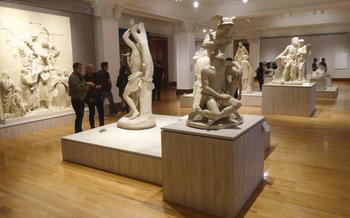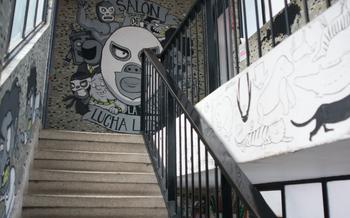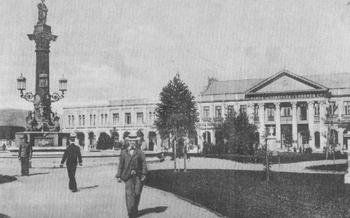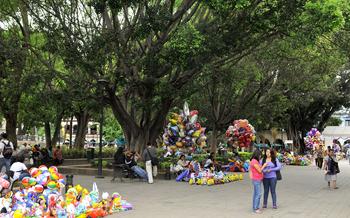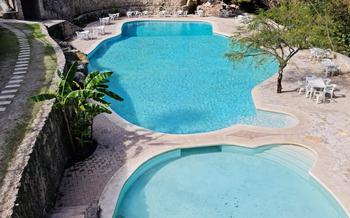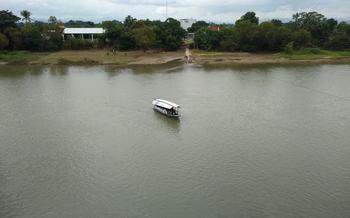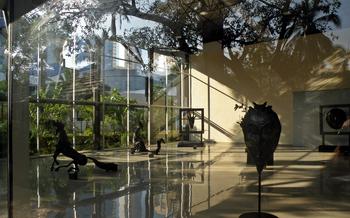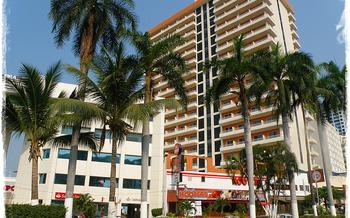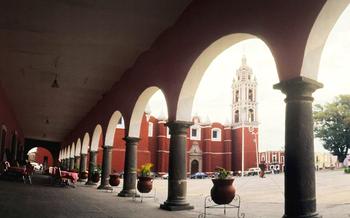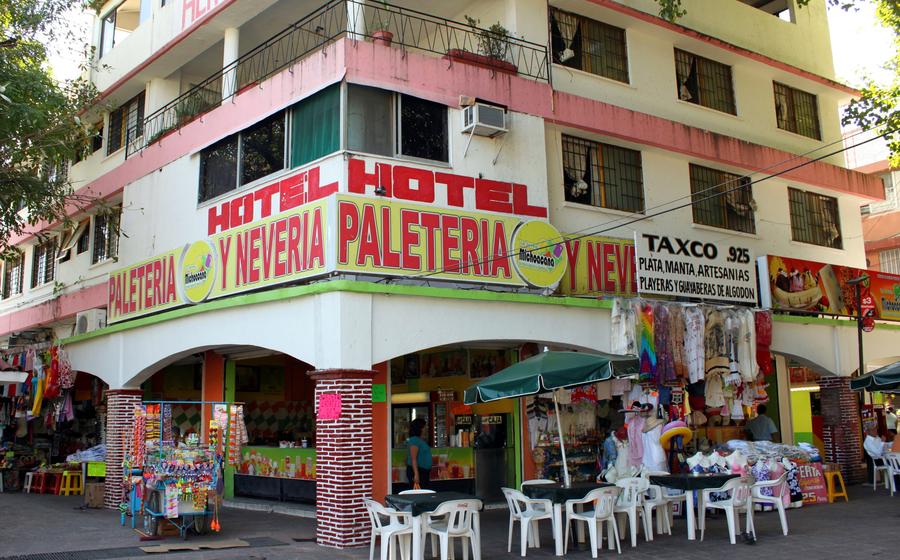
Museo de la Máscara
- Museo de la Máscara: Unveiling the Enchanting World of Mexican Masks
- Location and Getting There:
- Admission Fees and Hours of Operation:
- Guided Tours and Workshops:
- Exploring the Museum's Collection
- Pre-Hispanic Masks
- Regional Masks
- Contemporary Masks
- Interactive Exhibits and Displays:
- Workshops for Visitors
- Temporary Exhibitions and Events:
- Souvenir Shop and Artisans' Market
- Accessibility for Visitors with Disabilities
- Photography and Videography Guidelines
- Nearby Attractions and Activities
- Cultural Significance of Masks in Mexico
- Insider Tip: Mask Festival and Cultural Events
Museo de la Máscara: Unveiling the Enchanting World of Mexican Masks
Nestled in the heart of Acapulco, the Museo de la Máscara stands as a testament to the rich cultural heritage of Mexico, specifically its captivating world of masks. Founded in 1973, this unique museum boasts an impressive collection of over 10,000 masks, meticulously gathered from various regions across the country. Each mask, a masterpiece in its own right, showcases the artistry, symbolism, and cultural significance deeply embedded in Mexican traditions and rituals.
Step into the realm of the Museo de la Máscara, and embark on a journey through the captivating history of Mexican masks. Discover the ancient origins of these enigmatic objects, tracing their evolution from pre-Hispanic civilizations to the vibrant contemporary era. Witness the intricate craftsmanship and symbolism that adorn each mask, embodying the essence of Mexican identity and the diverse cultural expressions of its people.
Location and Getting There:
The Museo de la Máscara is conveniently located in the heart of Acapulco's historic district, just a short walk from the city's main square, the Zócalo. It occupies a beautiful colonial-era building on the corner of Hidalgo and Cinco de Mayo streets. Visitors can easily reach the museum on foot from most hotels and attractions in downtown Acapulco.
For those arriving by car, there are several parking options available nearby. The closest parking garage is located just across the street from the museum, on the corner of Hidalgo and Cuauhtémoc streets. There are also several street parking spaces available in the surrounding area.
Public transportation is also a convenient option for getting to the Museo de la Máscara. The museum is located near several bus stops, and taxis are readily available in the area. Visitors can also opt to take a guided tour that includes transportation to and from their hotel.
Admission Fees and Hours of Operation:
Admission to the Museo de la Máscara is very affordable, making it accessible to visitors of all backgrounds. General admission tickets for adults cost around $5-6 USD, while students, seniors, and groups can enjoy discounted rates. To further encourage cultural exploration, the museum offers free admission on certain days of the week or during specific events.
The museum's operating hours are designed to accommodate the diverse schedules of visitors. It typically opens from Tuesday to Sunday, with flexible hours that allow for both morning and afternoon visits. On weekdays, the museum is open from 10 am to 5 pm, providing ample time to explore the collection and participate in workshops. On weekends, the hours are extended until 6 pm, allowing visitors to immerse themselves in the history and artistry of Mexican masks at a more leisurely pace.
It's always advisable to check the museum's official website or contact them directly for the most up-to-date information on admission fees, discounts, and hours of operation. This will ensure a smooth and enjoyable visit to the Museo de la Máscara.
Guided Tours and Workshops:
The Museo de la Máscara offers guided tours in various languages, providing visitors with insightful commentary and deeper knowledge about the masks and their significance. These guided tours are available on a daily basis, with specific times listed on the museum's website. Advance booking is recommended to ensure a spot on the tour. The museum also conducts workshops where visitors can learn mask-making techniques and create their own masks. These workshops vary in duration and complexity, catering to different skill levels and interests. Some workshops focus on specific techniques, such as carving, painting, or decorating, while others provide a comprehensive overview of the mask-making process. Registration for workshops is required, and it's advisable to check the museum's website or contact them directly for more information on availability, costs, and scheduling.
Exploring the Museum's Collection
The Museo de la Máscara boasts a diverse collection of masks, organized into thematic sections that showcase the cultural richness and diversity of Mexico. Visitors can embark on a journey through the history of Mexican masks, from pre-Hispanic times to contemporary creations.
Pre-Hispanic Masks
The museum's collection of pre-Hispanic masks offers a glimpse into the ancient civilizations that inhabited Mexico. These masks, often made of stone, clay, or wood, were used in religious ceremonies and rituals. They depict a variety of deities, mythical creatures, and human characters, providing insights into the beliefs and practices of the indigenous peoples.
Regional Masks
The museum also houses a vast collection of regional masks, representing the diverse cultural traditions of Mexico's different states. Each region has its unique style and symbolism, reflecting the local history, mythology, and festivals. Visitors can admire masks from the colorful carnival celebrations of Veracruz, the traditional dance rituals of Oaxaca, and the intricate beadwork of the Huichol people.
Contemporary Masks
In addition to the historical masks, the Museo de la Máscara features a section dedicated to contemporary mask-making. This section showcases the work of modern artisans who are pushing the boundaries of mask design and craftsmanship. Visitors can appreciate masks made from unconventional materials, such as recycled objects, paper-mâché, and textiles, reflecting the evolving nature of Mexican mask-making traditions.
Interactive Exhibits and Displays:
The Museo de la Máscara captivates visitors with its interactive exhibits and displays that bring the world of masks to life. Multimedia presentations showcase the cultural significance of masks in Mexican traditions and rituals, allowing visitors to delve deeper into the stories behind these intricate creations. Interactive displays invite visitors to engage with the exhibits, testing their knowledge of mask symbolism and exploring the diverse materials and techniques used in mask-making.
Hands-on activities for children and families make the museum an ideal destination for educational and entertaining experiences. Kids can unleash their creativity at mask-making stations, where they can design and decorate their own masks using traditional techniques. These interactive elements not only enhance the learning experience but also foster a deeper appreciation for the artistry and craftsmanship that goes into each mask.
Workshops for Visitors
The Museo de la Máscara offers a variety of workshops that allow visitors to immerse themselves in the art of mask-making and learn from skilled artisans. These workshops provide a unique opportunity to gain hands-on experience in creating your own mask, using traditional techniques and materials.
Types of Workshops
The museum offers a range of workshops catering to different interests and skill levels. Some popular workshops include:
-
Mask Painting Workshop: Learn the art of mask painting, using vibrant colors and intricate designs to bring your mask to life.
-
Mask Carving Workshop: Experience the traditional technique of mask carving, using wood or clay to create a unique three-dimensional mask.
-
Mask Decorating Workshop: Explore various decorative techniques, such as beading, feathering, and appliqué, to add personality and flair to your mask.
Duration, Cost, and Registration
Workshop durations vary depending on the type of workshop and the level of complexity. Most workshops range from 2 to 4 hours. The cost of workshops varies accordingly.
To register for a workshop, it is recommended to book in advance to secure your spot. Reservations can be made online through the museum's website or by contacting the museum directly.
Benefits of Participating in Workshops
Participating in a mask-making workshop at the Museo de la Máscara offers several benefits:
-
Hands-On Experience: Gain practical knowledge and skills in mask-making, under the guidance of experienced artisans.
-
Cultural Immersion: Immerse yourself in Mexican culture and traditions by learning about the significance of masks and their role in Mexican society.
-
Creative Expression: Express your creativity and artistic abilities by designing and creating your own unique mask.
-
Memorable Souvenir: Take home your handcrafted mask as a cherished souvenir of your visit to the Museo de la Máscara.
Temporary Exhibitions and Events:
The Museo de la Máscara hosts a variety of temporary exhibitions and special events throughout the year, offering visitors the opportunity to delve deeper into the world of masks and Mexican culture. These events showcase the works of renowned and emerging mask makers, explore specific themes and regions, and provide a platform for cultural exchange and dialogue.
To stay updated on the museum's upcoming exhibitions and events, visitors can check the museum's official website or social media pages. They can also sign up for the museum's newsletter to receive regular updates and invitations to special events.
Attending these temporary exhibitions and events is an excellent way to gain a deeper understanding of Mexican mask-making traditions and to appreciate the diversity and creativity of this art form. It is also an opportunity to engage with the local community, learn about their customs and traditions, and support the preservation and promotion of Mexican cultural heritage.
Souvenir Shop and Artisans' Market
After immersing yourself in the world of masks, you may want to take home a souvenir to remember your visit. The Museo de la Máscara houses a gift shop where you can purchase a variety of masks, as well as other Mexican crafts and souvenirs. Whether you're looking for a traditional hand-carved mask, a colorful embroidered textile, or a piece of pottery, you're sure to find something that catches your eye.
Just a short walk from the museum, you'll find a vibrant artisans' market, where local vendors display their handmade goods. This is a great opportunity to support the local community and take home a unique piece of Mexican craftsmanship. Browse through colorful textiles, intricate jewelry, hand-blown glass, and other locally made products. You'll find everything from traditional souvenirs to one-of-a-kind artwork.
Remember to haggle gently with the vendors to get the best prices, and be sure to carry cash as some vendors may not accept credit cards. Immerse yourself in the lively atmosphere of the market, chat with the friendly locals, and take home a piece of Acapulco's vibrant culture.
Accessibility for Visitors with Disabilities
The Museo de la Máscara is committed to providing an inclusive and accessible experience for all visitors, including those with disabilities. The museum is wheelchair accessible, with ramps and elevators to all levels of the building. Additionally, the museum offers special services and assistance for visitors with disabilities, such as sign language interpreters and audio guides. Visitors with disabilities are encouraged to contact the museum in advance to make arrangements for any special needs they may have.
Photography and Videography Guidelines
Photography and Videography Guidelines
When visiting the Museo de la Máscara, visitors are encouraged to capture the beauty and artistry of the masks through photography and videography. However, there are specific guidelines that must be followed to ensure the preservation of the artifacts and the privacy of other visitors.
- Permitted:
- Photography and videography for personal, non-commercial use are generally permitted.
-
Flash photography is allowed in designated areas only.
-
Prohibited:
- The use of tripods, monopods, or selfie sticks is not allowed.
-
Commercial photography or videography without prior permission from the museum is strictly prohibited.
-
Tips for Capturing Great Shots:
- Use natural light whenever possible to avoid harsh shadows and reflections.
- Focus on the details of the masks, such as the intricate designs and craftsmanship.
- Experiment with different angles and perspectives to create unique and visually appealing shots.
- Be mindful of other visitors and avoid disturbing them while taking photos or videos.
By following these guidelines, visitors can help preserve the integrity of the Museo de la Máscara's collection while capturing their own lasting memories of this unique cultural institution.
Nearby Attractions and Activities
After immersing yourself in the world of masks at the Museo de la Máscara, don't miss the opportunity to explore the many other cultural treasures that Acapulco has to offer. A short walk from the museum, you'll find the iconic Acapulco Museum of History, where you can delve into the city's rich past and its significance as a major port city.
For those seeking a more active experience, the sprawling Parque Papagayo is a must-visit. This beautiful park features lush gardens, a variety of animal exhibits, and thrilling amusement park rides, making it a perfect destination for families with children.
To truly embrace the vibrant culture of Acapulco, head to the Zócalo, the city's central square. Here, you can soak in the lively atmosphere, admire the colonial architecture, and perhaps catch a traditional dance performance or musical show.
If you're a beach lover, Acapulco boasts some of the most breathtaking beaches in the world. From the popular Caletilla and Condesa beaches to the more secluded Playa Revolcadero, there's a perfect spot for every sun seeker. Indulge in swimming, sunbathing, or trying out exciting water sports like snorkeling, scuba diving, or jet skiing.
A visit to Acapulco is incomplete without sampling the city's renowned nightlife. From lively bars and nightclubs to traditional cantinas and dance halls, there are endless options to let loose and experience the infectious energy of this vibrant city.
Cultural Significance of Masks in Mexico
Masks have played a profound role in Mexican culture for centuries. They have been an integral part of religious ceremonies, festivals, and rituals, serving as powerful symbols and representations of various deities, spirits, and mythological figures. In pre-Hispanic times, masks were used by indigenous civilizations to connect with the divine and to honor their ancestors. They were believed to possess supernatural powers and were often used in rituals to invoke protection, healing, and guidance.
Throughout history, masks have continued to be an important aspect of Mexican identity and heritage. They are used in traditional dances, such as the Danza de los Concheros and the Danza de los Voladores, as well as in popular festivals like the Day of the Dead and Carnival. Each region of Mexico has its own unique mask-making traditions, with distinct styles, colors, and designs that reflect the local culture and history.
Masks are not just decorative objects but also powerful symbols of identity, transformation, and resistance. They allow individuals to express their creativity, to escape from the mundane, and to connect with their cultural roots. By exploring the Museo de la Máscara, visitors can gain a deeper understanding of the rich symbolism and cultural significance of masks in Mexico, and appreciate their enduring role in shaping the nation's identity.
Insider Tip: Mask Festival and Cultural Events
For an immersive experience of Mexican mask culture, plan your visit to Acapulco during one of the city's vibrant mask festivals or cultural events. The Festival de la Máscara, held annually in February or March, is a must-attend event that showcases the artistry and creativity of mask makers from all over Mexico. Immerse yourself in colorful parades, live music, dance performances, and exhibitions featuring a dazzling array of masks. Don't miss the opportunity to witness traditional mask-making demonstrations and workshops, where you can learn the intricacies of this ancient craft from skilled artisans.
Another highlight is the Noche de las Máscaras, held in November, which transforms the city into a magical realm of masks and revelry. The streets come alive with masked performers, live music, and art installations, creating an enchanting atmosphere that celebrates the rich cultural heritage of Acapulco. Embrace the spirit of the festival by donning your own mask and joining the lively processions that wind through the city's historic streets.
Attending these events is a chance to not only admire the artistry of Mexican masks but also to gain a deeper understanding of their cultural significance and symbolism. Immerse yourself in the vibrant energy of these celebrations and experience the passion and creativity that make Acapulco a true treasure trove of Mexican mask culture.
